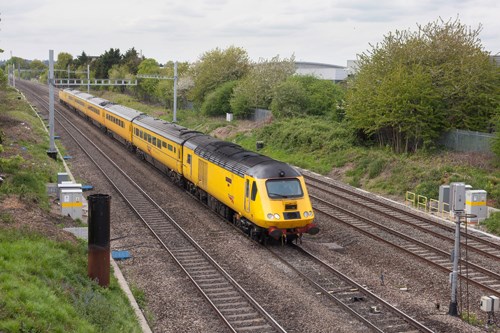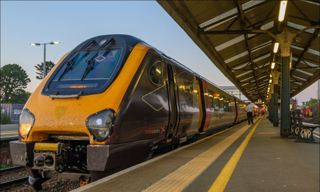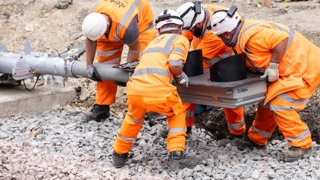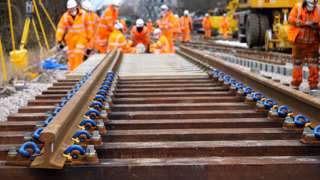Electrification is a necessary part of the on-going development of the UK rail network. Benefits for passengers include better reliability and more seats, not to mention the sustainability case and the effect on regeneration.
But why is so much work on electrification being done now? Purely in terms of electrification, it is going to take 40 years to put the UK on a par with other European countries. Shouldn’t this work have started 20 years ago?
Regardless of the arguments over timing, Britain’s railway system is on the brink of a major transformation, with much of the main line network set to be electrified in the coming years. In 2009, the Labour government set out investment projects, such as the electrification of the Great Western Main Line (GWML), under the Secretary of State Andrew Adonis.
In July 2012, as part of its High Level Output Specification, the Government announced a further tranche of wiring schemes in England and Wales (among many other improvements and enhancements). These improvements included the Midland Main Line between Bedford and Sheffield - part of a £9 billion plan for rail investment (some of which had already been committed) that is now covering the electrification of the entire GWML, from its current limit around Heathrow Airport Junction near Hayes and Harlington, as well as both routes to Bristol, Cardiff and Swansea. After much political wrangling, a deal has now also been struck with the Welsh Government that will see the Cardiff Valley Lines electrified by the end of Control Period 5.
The GWML scheme also includes wires to Newbury and to Oxford, where other electrification schemes continue on to Coventry and Nuneaton and across to Bedford as part of East-West Rail (via the currently closed Bicester-Oxford line).
The ‘Electric Spine’, which will effectively link Yorkshire to the south coast, will cover the electrification of Reading to Basingstoke, where AC overhead wires will continue over the currently third-rail DC lines to Southampton. That scheme could potentially act as a pilot for the future conversion of other former Southern Railway third rail lines to overhead wires.
One project already completed is Liverpool Lime Street-Manchester Airport (which went live in March). The Blackpool-Preston/Manchester line is on course for completion in 2016, as well as the line across the Pennines to Leeds.
In all, some 900 track miles of additional railway should be AC-electrified in England and Wales by 2019, with innovations such as a ‘factory train’ helping to expedite the work. However, the trans-Pennine scheme may not now go ahead until Control Period 6.
Electrification in Scotland is a matter for the Scottish Government, as opposed to the Department for Transport in the rest of the UK, although the work will still be delivered by Network Rail. The £742 million Edinburgh-Glasgow Improvement Programme will mean that the main line between Glasgow and Edinburgh (via Linlithgow and from Cumbernauld towards Glasgow) will be electrified. Completion is expected by 2016.
NR has clearly begun in earnest a major programme of electrification on key routes across the UK railway network - which will mean faster, greener, quieter and more reliable journeys for thousands of passengers. It is supported in this by the Government, which has committed to investing in a programme of electrification to transform the railway and provide Britain with a sustainable transport system built to the highest standard.
National Electrification Programme Director Saleem Mohammad is as knowledgeable and passionate about electrification as you might expect. Clearly he’s an advocate of electrification, yet he’s refreshingly realistic about the current electrification programme now under way.
Just over a year ago, Network Rail awarded the major framework contracts. Successful bidders included ABC, Balfour and Carillion. These work specified in these contracts would enable the delivery of major electrification schemes on the Great Western Main Line, the Midland Main Line, and in the North West.
Mohammad’s team - the National Electrification Delivery Steering Group - sits at the top of a structure that is designed to make the most of electrification in the UK. The scale of the work to electrify during Control Period 5 has not been without its challenges, with the various groups working to ensure that the industry’s supply chain is working as efficiently as it can. These new electrified railways must be fit for purpose, although not, as Mohammad reminds us, “at any cost”.
It’s Mohammad’s job to ensure that sufficient resources, qualified people and integrated planning are in place - crucial elements for what lies ahead (and indeed, what has already started).
“The last time we did this level of work was 25 years ago,” he says, referring to the East Coast Main Line electrification between London and Edinburgh, which was completed in 1991.
“Since then, we have lost staff. And the plant got a bit rusty. Around £4bn is currently committed to electrification. Not only is that a significant step up, but HS2 is ramping up too,” says Mohammad. “We are relying on a number of resources. Regional programmes are using a lot of the same resources. The National Grid is also in quite a poor state.”
Mohammad and his colleagues must look at the national picture, and try to identify economies of scale wherever possible. With the need to essentially start again on a rolling programme of electrification, there is a need to ensure that lessons can be learnt from the current schemes - the knowledge must be gained in readiness for the 2019-2024 period. “We can’t predict what will happen in CP6” says Mohammad. “It’s about getting it right now, but also preparing for the future”.
The benefits of railway electrification haven’t always been widely recognised. After all, aside from one exception, the 1997-2010 Labour government did not sanction a single electrification scheme. While some civil servants at the Department for Transport may have been convinced that electrification is a good thing, it’s certainly not the case that ministers understood its value.
“There are a number of factors. Take a typical diesel train and replace it with a typical electric train. You get a 30-35% reduction in CO2 emissions” says Mohammad.
The industry’s preference is for modern passenger trains to have a traction package underneath the carriage - removing the need for an engine at the front allows for a 20% increase in passenger capacity. Electric traction packages allow for improved performance with faster acceleration and deceleration. On a typical commuter line - such as London-Paddington-Swansea, this allows trains to not only reach their destinations more quickly, but also be turned around more speedily at each end of the line. With the increased train paths available, more trains can run, and therefore capacity is increased.
The benefits to the wider economy are also felt. It’s possible that Britain’s power needs will not be met fully in the future, given the decline and gradual closure of the coal industry, and the delays in bringing new nuclear power on stream, let alone renewable energy. The National Grid may find itself struggling to meet demand.
The ‘smart grid’ puts more focus on power regeneration and using power more intelligently. When traction motors on electric trains run in reverse - i.e. when they are slowing down – they can generate energy, which can then be stored and used towards the next journey.
“Likewise, by predicting our energy usage we can take any surplus energy and put it back into the National Grid”. The overall demands on the UK power network then starts to go down.
With fewer moving parts, electric trains are also more reliable and require less maintenance. Not only that, but electric trains are lighter and cause less wear to the track, helping the railway overall become more reliable.
Modern electric trains also have good fault-finding capabilities. “Newer trains can gather data about the health status of the infrastructure. We are moving into a different world where we can even predict the health status of the infrastructure - from the condition of the track to the overhead wiring itself.” Mohammad draws parallels with the aviation industry, which has engineers on standby ready to fix a fault when an aircraft lands.
But if the benefits of electrification are so clear, then why have we left it so long to install it? Mohammad is clear about the issues that has thrown up, but cannot say why decision-makers did not agree earlier to the sort of schemes that are going ahead now.
“Having left such a gap we have a significant problem,” says Mohammad. “The Government signed up to a sustainability pledge. Electrification is part of that solution.” So is this all purely to ensure the UK’s climate change obligations are met?
“There’s a strong business case, but it’s not at ‘any cost’ project. Ultimately, it is a political and economic decision. Do I know why it hasn’t happened for 25 years? No”.
But most European countries have significantly more electrified railway than Britain. It is the aim, with current planned schemes, to increase the proportion of electrified railways here from 40% to 50%. It’s unrealistic to expect all routes to be electrified, with a role being identified for independently powered EMUs which can run where there is no wiring. Other technologies may come into play to replace DMUs in the future, as well.
“Ultimately it is up to the Government to decide what is right for UK plc” says Mohammad.
Pointing to China’s enthusiasm for electric railways, and its many hundreds of miles of high speed lines, Mohammad is a visionary for the potential of electrification to not only achieve the benefits outlined, but improve the world’s perception of the UK’s railways.
Diesel-powered trains are increasingly seen as unattractive to visitors, particularly those with which Britain might want to do business. “We are very much in that global market now. Our infrastructure has to be equal to or better than the competition. We are in a very different world. It is an image thing”.
Mohammad goes on: “A lot of people have worked very hard to make the UK a great place. And it is a great place. London is a financial capital. And the regeneration we are seeing in our cities - London, Manchester, Birmingham - is transforming them”.
“The transport system has to step up to that mark”.
This is where the relative reliability of electrified railways comes into play. “People are less tolerant now of a train that is 10-15 minutes late”.
Mohammad is frank - Britain is off the pace. In his view: “We should have done it four years ago” he says.
But he does not deny or play down the cost overruns on the Great Western Main Line and Midland Main Line schemes for example - where electrification will come in at double the original price. He regrets those inflated costs, but nevertheless values the long-term approach, and backs it up with a look back at 20th century history.
“There will still be a payback. In the Second World War, the development of a particular aircraft cost £1 million. People said it was a lot. It was the Spitfire. It helped to win the war for us”.
“Now we are lagging behind. We have to look at ourselves from the global perspective. Denmark is looking to electrify the entire country at 25kV. The French are looking at upgrading. The Germans want faster trains”.
Mohammad regrets some of the changes that took place in the 1990s and 2000s – in particular breaking the continuity of a continuous programme of electrification of the network. “Privatisation took us on an interesting journey, but we lost something when we got rid of British Rail.”
“Electrification is an enabler. We have got to start growing, at a grass roots level, our engineering skills,” he says. “For the future, it will put us in a much better place”.
Have we got all the skillsets we need just now? “No. But we are trying to rebuild them. We have lost a lot and we are going through a painful learning curve. The key to recovery is looking to the future. We cannot afford a 20-year lull.”
- This feature was published in RAIL 775 on May 27 2015
















Login to comment
Comments
No comments have been made yet.